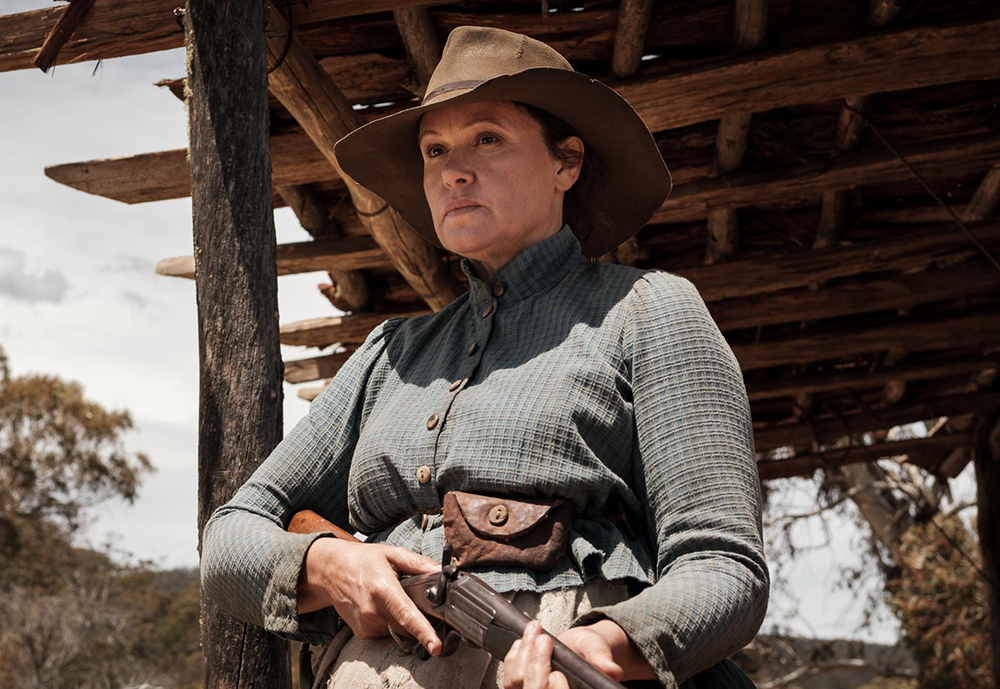The Drover’s Wife is on general release in the UK from Fri 13 May via Modern Films. Find your local screening! Both subtitles and audio description are available.

The release is supported by Bird’s Eye View’s #ReclaimTheFrame, with two upcoming screenings that include a Q&A, at Sheffield Showroom on Fri 13 May, and at Lewes Depot (hosted by BEV’s Rui Jin), on Thurs 17 May.
This Q&A between BEV’s Melanie Iredale and (via Zoom from Melbourne) The Drover’s Wife writer, director, co-producer and star Leah Purcell (Goa-Gunggari-Wakka Wakka Murri) was recorded at a #ReclaimTheFrame preview screening at Rio Cinema on Mon 9 May 2022, with transcription by Julia Jacobie. Thank you to Leah, Julia, Melanie and the BEV team for permission to reproduce the transcript here.
MELANIE: Hi everyone, good evening, and good morning, Leah. Also just to say we have got Julia here who is captioning everything we’re saying, thank you Julia.
LEAH: Good luck, Julia.
MELANIE: So Leah, thank you for sharing this incredible epic with us. I just have the great pleasure of watching the on the big screen for the first time, and incredible thank you.
So, Leah you have been working on bringing this story The Drover’s Wife to life in a number of ways, and over a number of years. I wonder if you could tell us first a bit about the source material, to start from the beginning, and tell us a bit about what it means to you but also your approach to adapting it.
LEAH: Yeah, well firstly thank you to everyone for being there tonight. Yeah, I was 5 years old and my mum would read the Henry Lawson short story to me, it’s only 9 pages out of this little book [Leah holds the book up to the camera]: I brought some show and tell. And I knew that I was 5 years old because I wrote on the spare pages, in the book, ‘Dora, Dick and Nip’, that was my Grade One reader, it’s a great record I was 5 years old. And I think the reason I connected to the story was I used my imagination and put myself in the story. I was, there was… it’s about a young little boy and his mother, and I was that little boy, I was my mother’s protector.
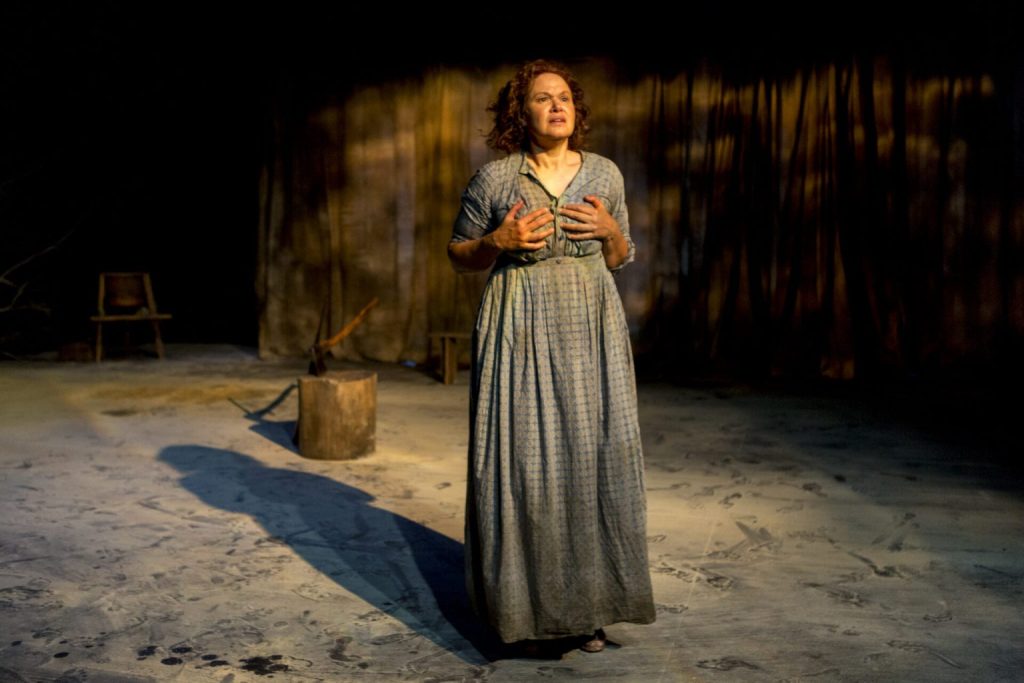
My mother also was like The Drover’s Wife, there was no male figure, my white dad wasn’t around in the family and so my mum was the man of the house. She was the mother, she was the father. We lived on the outskirts of town on the last streets in the town, combustion stove, we had a woodpile, she said, “don’t stack it hollow or the snakes will get under:. It was lines that came to life for me from the original story of Henry Lawson. And also the other factor was in my mother’s young days, her father ran a property so she was a drover, he was a drover and just recently a family photo had surfaced that my great‑grandmother’s mother, she’s 15, there on the caption when we found it [Leah holds the photograph up to the camera], it said she was a drover as well. The love of horses came from her, I guess. This story, I was meant to tell this story I think.
And then also, when I first sat down to write The Drover’s Wife, it was for theatre, it was a play. And that was in 2016. I won the Balnaves Fellowship award in Australia which allowed me to work closely with the theatre house, and that theatre house gave me editors and access to people to read my stuff and then at the end of the process if you work was good enough, you got a season at Belvoir Street Theatre. So I have only ever done one season of the play because I went off and did Wentworth [2013-21 TV drama, a much darker remake of Prisoner Cell Block H, in which Leah played boxer Rita “the Beater” Connors] and then got caught up with the making of the film.
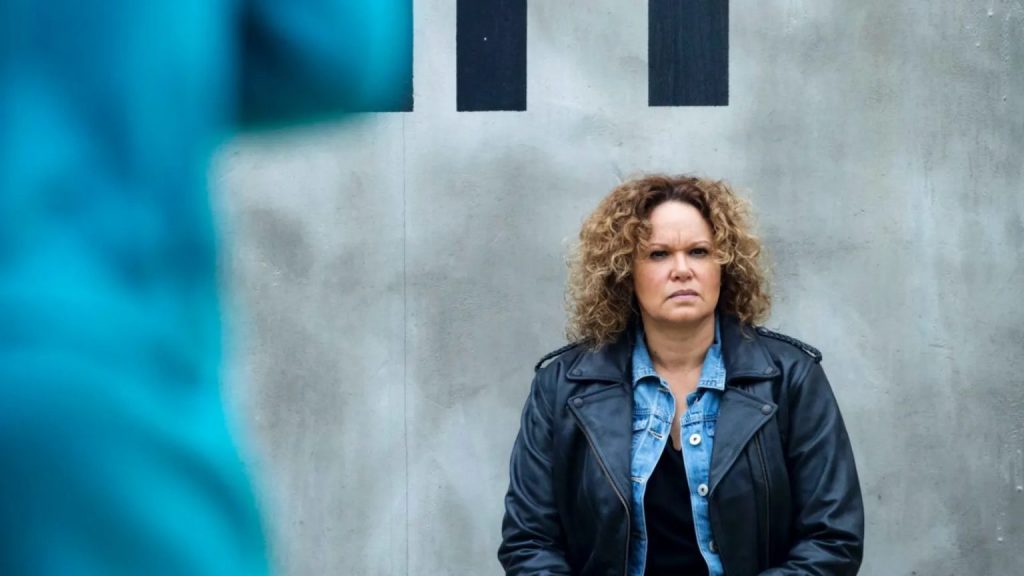
Also, when I was going through the process of reimagining, to use the word, the Henry Lawson: my mother’s Indigenous, and I grew up with my Indigenous family, my Aboriginal family. I need to go back and layer a level of truth, I use that at the moment in my writing for my family’s stories as my basis of truth, to lay my stories on the foundation that I feel strong in, and that I go off and create. I used my great-grandfather’s diary. This is who Yadaka [played by Rob Collins] is loosely based on, my great‑grandfather’s diaries. And the truth in the film is that he was actually given, well we don’t know if he was given, stolen, went for slave labour, then ran away from somewhere tough, went and joined the South African circus that was sitting on the east coast of Australia 1891 to 1903. When he [Yadaka] says he fed a tiger, calmed a bear and taught six horses to dance, that was true: he [my great-grandfather] was with the circus. Unfortunately, they left him destitute in Melbourne, he was arrested and thrown into one of the toughest prisons in our country, Pentridge. He was almost dead when Father Matthews found him and rescued and took him back to the mission, or it’s like a reserve I guess for First Nations Americans, that kind of reservation, and taught him to read, write and play the tuba, and then he was always trying to get back home to Queensland. So that’s the truth that sits in it.
And the stockman, what the stockman says to Yadaka was almost verbatim from this diary, because that was written from white supremacy of the time, so it really gave me a feel of I guess the social climate, the racism around that time, and looking at the colonial violence, and then of course doing my own research, through Henry Lawson’s stuff in general. There was the gender inequality, the brutality of the time and the racism which is very similar to Henry Lawson’s undercurrent in his story, but I just put oxygen in them, blew them up, put it in the Western genre which allows me to point guns at people, and to go there with that kind of language and dialogue, and in a way I went and pushed to it forefront and of course put on the lens, coming through the lens of an Indigenous woman and my family’s stories.
And also just on that, the piece of paper that goes into the fire [a legal document seen in the film that consigns Molly Johnson’s children to enforced state removal], that’s my grandmother’s story, my mother’s mother. She was part of the Stolen Generations, and that was paying homage to her, and I guess The Drover’s Wife sits in closely to my mother as well. My mother had never had a voice, my Nanna never had a voice. I am sitting in this present time, I have opportunities to give voice and come through my art, and put Indigenous issues on the table but coming from a heartfelt place, because they are my family’s stories.
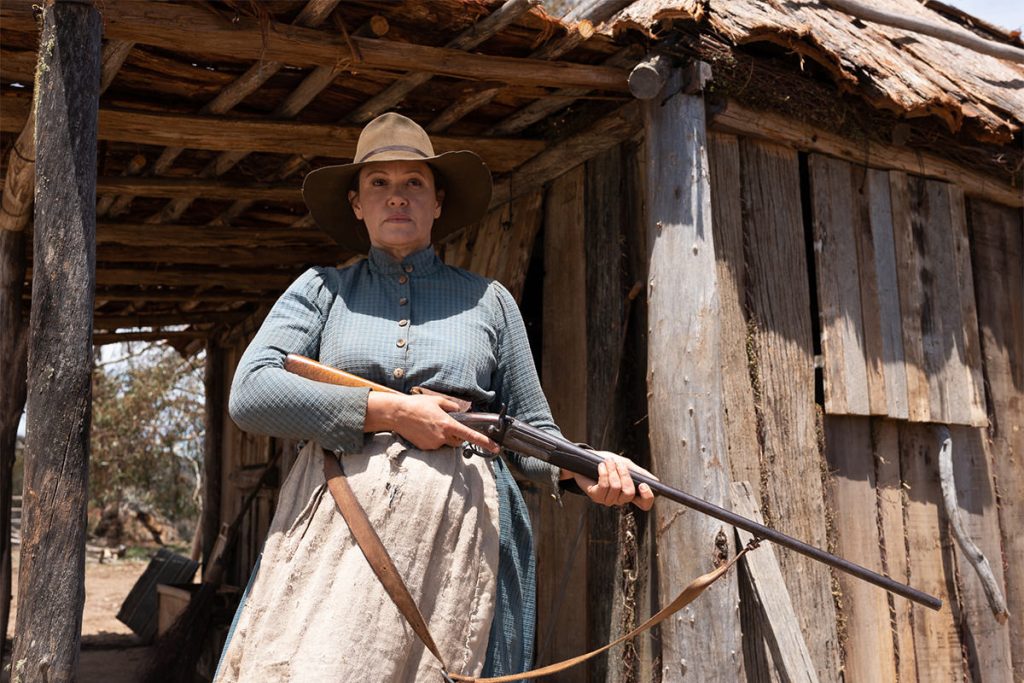
MELANIE: Thank you so much. And I want to ask how was the process of finding the support and the finance for getting this film off the ground, as you say it speaks to a truth that has been long suppressed and we’re talking here on the kind of eve of its release in the UK, where you know the legacy of colonialism and the violence done from a UK perspective continues. I just wondered, yeah, like if this is not film that’s cheap to make, it’s epic, and I just wondered yeah about what you faced perhaps in getting the support to get the film made?
LEAH: We had to have some allies. Because this was my first film, and normally in Australia you get a budget of $1 to $3.5 million, and of course this was all done on location. The film was $7.2, we went to our government agencies like Screen Australia, and Create New South Wales to get seed money. Then there’s what they call a gap you need to achieve. A lot of people just sit with what Screen Australia and New South Wales give and make them films with that, but we went out and got private investment, philanthropic support for our film. And when I say the allies, like the Balnaves Foundation that supported me in the theatre, knowing the story worked, we showed every day: we had standing ovations every time and encores, they knew the story worked. They supported me in who I was as the artist.
I have been 30 years in the industry now, finally a door is opening! There’s a lot of hustle. You know in our country especially because it’s small, the industry is small. So finding those allies that believed in me as talent, believed in what I said what my voice was, what my work is about. Then of course I wrote a really great first draft, we were commissioned on the first draft which is kind of unheard of. But my partner in life and business, Bain Stewart, who is the lead producer on the film, did something wonderful in the sense that he brought all those funding bodies, all the people that we thought might be interested in investing in us, that knew what my work was about, to the opening night of the play. He was going fingers crossed that we got reaction we did it. He turned to all those people said, “You’re in this now, you’re in it for the long haul, how about let’s talk about the film?” So, and you know it was his amazing support for me and his push and belief in the project. And he’s a great people person, so he really reached out and nurtured the people that were wanting to invest in as well. When you have got your big agencies on board that helps and then the agencies are very proud that we actually went out and covered that gap of $1.5 million. So it was the hard work, but we got there.
MELANIE: As I say a lot of hustle. Has anybody got any questions or comments on the film?
LEAH: Did everyone like it? How’d you go? Did I move you? Anyone cry, had a laugh? There’s a little chuckle in there. [applause and cheers]
MELANIE: I’m sorry, I think the first round of applause you got, my mic wasn’t on yet so you couldn’t hear it. Sorry yes hi. I will repeat it [your question] through the mic.
Audience question: I love everything about the film, but I want to ask about the score by Salliana Seven Campbell – and your voice in there as well! Such a brilliant response to the role music plays in Westerns. I just wanted to know: was it part of the play, or was it for the film, or how did you make it?
LEAH: I did hear that, thank you for projecting. Yeah, Salliana Seven Campbell, what a gem. This is her first feature, she’s done a lot of docos and a lot of theatre. There’s a band [Powderfinger], Bernard Fanning the singer, he’s quite big in Australia and Salliana plays fiddle for him. So I found her through a friend, and I sort of gave the friend the brief and to Salliana I said, I would love to work with a female. Salliana is not Indigenous, she said, “Should it be an Indigenous person?” I said, “Well no, Molly has grown up with her white dad of Scottish heritage so I think your background in folk music is kind of perfect”, and we spoke about what those sounds would be of the High Country with the music. But I also wanted to, what my brief to her when she got the gig, I was up at 2am in the morning, and I was doing work and she sent through an extra bit of music. I said, “What are you doing up?” She said, “What are you doing up?” “I think you might have just got the job if you’re as crazy as I am to be up at 2 am creating!” She said, “I needed to get this out, I know it’s extra but I couldn’t sleep”. I said, “Well, I think you’re the girl for the job”.
And then my brief to her finally was I want – It’s another Aboriginal cultural way of speaking and what we do in ceremony times it’s: sing people to country. You bring them through music, you connect through country, through music. We have songlines for people when you travel across country. When you go into someone else’s country they pick up the song, so I said you want to bring [the characters] Louisa and Nate Clintoff from the UK, from London, and bring them to country. So it was sort of, in the Western sense it was giving every major character a theme song, a theme composition. I said we don’t have to use it in its entirety, we can strip threads from it and just give essence to it.
And then I also thought, you know we want something for the young people to come in. We’re encouraging people to come to the theatre and cinemas, and I said what if we had the commercial edge to it, contemporary edge as well to the music. I love it. I also had a band in the 80s, I was a rock chick so I, we were both influenced with the heavy guitar, the electric guitar going off, I just felt it needed that. Even though it’s a story of the past it’s still – a lot of issues are relevant today, and I wanted to bring the future today in through that way.
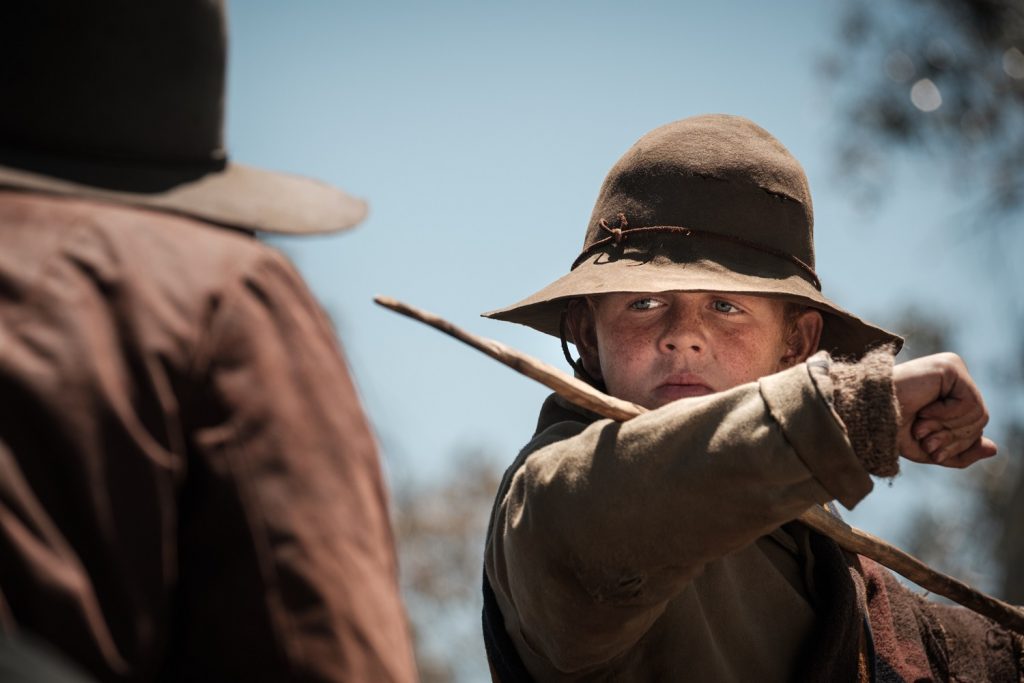
In regards to the song [“Black is the Colour of My True Love’s Hair,” which is sung over the final scenes and end credits by Leah], I had actually wanted other people to sing it. As I said, I had a band but I had not sung in 20 years; something had to give, I couldn’t do everything. So, the music sort of slipped to side and there were other well‑known singers in Australia that I was sort of throwing their names around, and then Salliana said, “Leah no, it’s actually, I am not talking about using it, it needs to be Molly’s voice”. She said, “Get over yourself” [laughter]. And I said “Oh my gosh, you are so right”. And she said, “You know, that last breath that Molly has, that goes on the wind and reaches her children, in the mountains?” She said, “This is the follow up of that, that breath, those whispers becomes Molly’s voice that will be with her children”. You can see through Molly and Danny the passing down of the song from her father. Yes it’s an Irish, or Scottish lament, he sung it his way then Molly and Danny inherited that. It’s very close to our Indigenous practice of inheriting stories. So I am glad you enjoyed the music.
You know, I sort of wanted to bring back that element of composition through films. I know nowadays there’s some films where hardly have any sort of music, but I appreciated the music. I think for me it wove character and country together. As an Indigenous woman in a cultural sense that’s exactly what our songs and music does.
MELANIE: Thank you. Is there anybody, any other questions? Or comments?
LEAH: Can I talk about, yeah, can I talk about the cultural element of the bullock story? When I write there are always two components, the Indigenous component and another. The Indigenous people will see other elements, and pick up on the cultural elements. One of the cultural things in the storytelling is the repetitiveness of stories. And that’s how Indigenous people have survived for so long, the repetitiveness of the story, the regurgitation of the story. I wanted to show it simply in the bullock story, because that story was repeated. And there was – we write in 5 act structures as well – but in the sense of sharing of that story: so Molly experienced it, right? She had to go out and she had to shoot it [the wild bullock]. Danny witnessed it. Danny then embellished that story and gave it to Yadaka who’s an outsider. It’s the outsider’s responsibility to keep that story alive, so when he goes on his journey he will tell that story to someone. If anything ever happens to the Johnson family they can place them within a story on a property at a time. Then of course Yadaka embellished with traditional gestures of the bullock, then Danny retells that story with his children at the end of the play, so [loss of sound]…
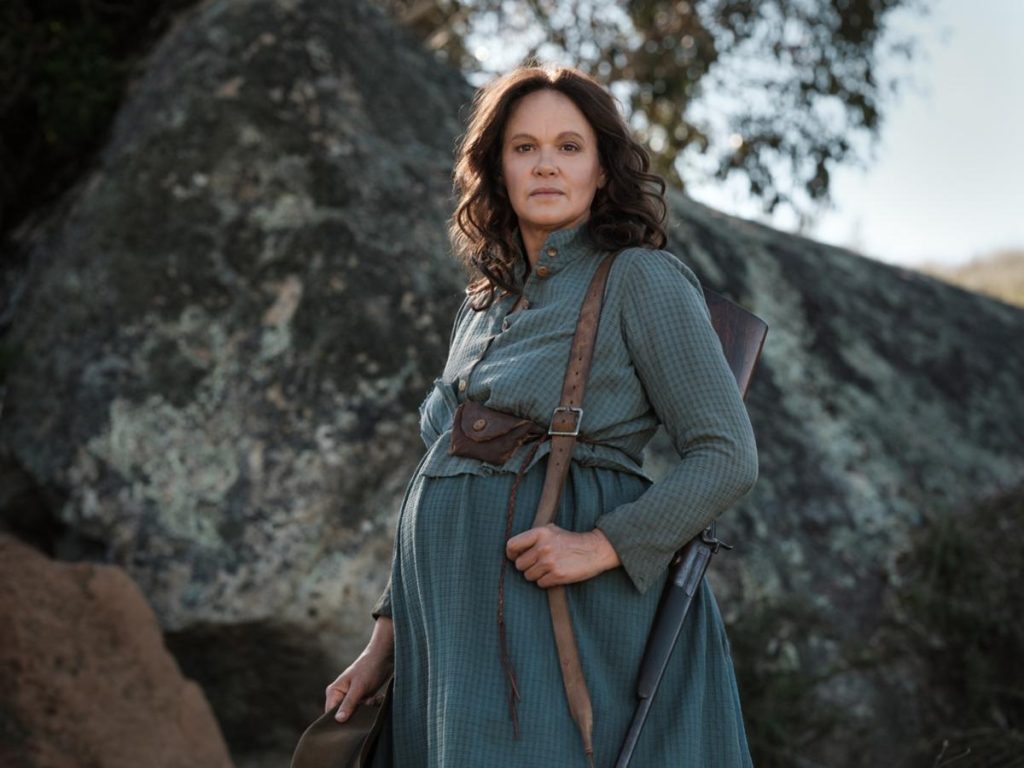
It continues to live in memory and story. For me, in Australia we call this our dreaming. This is our dreaming right now, me, you, Mel and that audience. We’re sharing a moment. Dreaming is about moments in the past, right now, and into the future. So I’m giving the audience in that room the responsibility of taking our dreaming now, because as you said before Mel, the UK had a big impact on what happened in this country, the Brits, and this is our shared dreaming so it’s your responsibility to go out and sell this show and tell people about it! [laughter].
MELANIE: Absolutely. On its release on Friday we need to spread the word. Leah, you have lived and breathed this story for so many years, yeah it would be great if you could say a bit more about what it means to be finally sharing this story with cinema audiences, and for its release like in the UK and around the world, and also is this the last incarnation we will see? Is there’s even more to this project to come?
LEAH: There is more to this project to come, but we’re very excited to be finally out, because of course COVID affected us as well. In Australia at the end of 2019 we had these massive fires, and they were actually up where we were shooting so the opening scene, excuse me, the opening scene of the wagon coming across when we left that area finally wrapped and left it, that area within 7 to 10 days that was all blackened by fire came through. So we missed the fires. That scene where Molly is doing Yadaka’s hair, that beautiful mist round there, it’s not a smoke machine, it’s actually fires. We had fires to the north 70 clicks and a fire to the south 70 clicks. We managed to get the film shot and you know it was really interesting, there was a local newspaper that came onset they said, how ironic Molly Johnson on country is having to make decisions to save her family, and literally women in that area in 2019 were doing the same thing, because their husbands were out fighting these horrific fires, and they were at home trying to make the decision do they pack up the kids, take the pets, and run for their lives, or do they stay and fight. He said they were all Molly Johnsons.
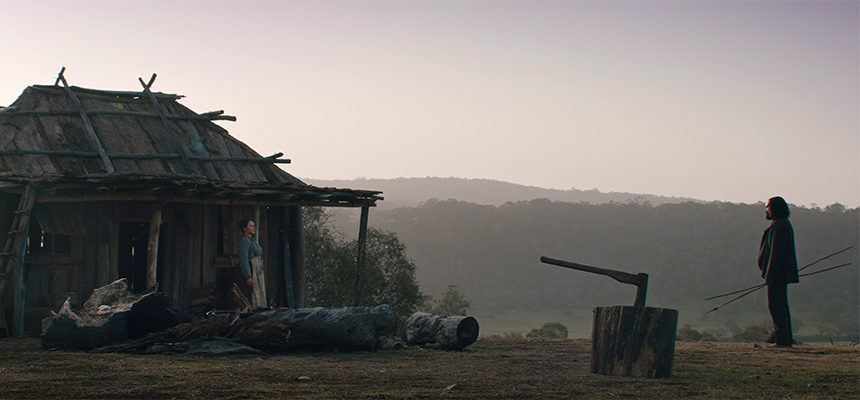
So yes, I was out creating a movie but these people were fighting for their lives, so bless them. Then of course I did picture lock off on 13th March, so I love that, when this is opening on 13th May [2020]: it was Black Friday here on 13th March and literally that next month we were in a lockdown in Australia due to COVID. So we have had a couple of false starts in getting out, we have had 4 dates we said “no, COVID; no, COVID; no, COVID.”
So it’s like I have been pregnant with this thing for three years, and I have finally given birth and it’s just amazing how much you don’t, you don’t realise how much you carry of it. You have got to hold it, you are still nurturing it, you have got to sing it up to make sure that people have not forgotten that it’s coming. Here we are.
So I am thrilled. I love this film, I worked so hard on it. I am a ruthless editor: I threw out 12 scenes. I had 8 days to go, I said, “Act 2 is not working.” My editor just lost her head, she said “Leah, if we unpick that you know it could unpick the lot?” Yep, although we have got 8 days to sew it back up. I, everyone worked really hard, we’re all very proud of the film, and we’re just so excited to share this story. All I want is basically, Number 1 that people think they got their money’s worth when they buy a ticket because it’s not cheap these days to get to the movie, and that they were entertained. I hope they were emotionally stimulated and also intellectually.
I hope it brings about conversations and in my writing I leave a lot of things open for discussion, and one of the first things that come to mind is: did Yadaka commit those murders or not. Are you going to judge him on his skin colour or his character? So that is open for debate. You know that I want people to discuss. There’s a few issues throughout there that if you freeze the frame, there’s a whole another film underneath it, which is exciting which I think allows the film to breathe and to live and to have that conversation around it.
So we’re extremely excited that it is opening in the UK, and as I said, someone said to me last night, we had a screening in Melbourne – I live in Sydney – but someone said this is not just an Aboriginal film, it’s an Australian film because of the shared history, it’s a UK film because of the influence that the UK has had on Australia. It’s our film so I reckon that’s pretty cool and there’s connection, more than just this is drama, or you know, this is action. So there’s an undercurrent of truth and ownership of this film for everyone.
MELANIE: Thank you so much Leah, thank you for sharing, this incredible film with us, this dream as you say and this truth. It’s such an important film, and so yeah so many important conversations to come from it, and thank you so much. Let’s say thank you to Leah [applause and cheers]
LEAH: Thank you.
MELANIE: Thank you for getting up so early for us as well, we appreciate it, it was amazing to hear from you, thank you. Thank you to Julia for captioning everything, appreciated it [applause]. Thanks everyone for showing up this evening, thank you yeah, it’s been brilliant to share this evening with you. Please do support the film on its release, it’s out on Friday, so yeah please do spread the good word about The Drover’s Wife. You can find what’s coming up for next for us Bird’s Eye View on like #ReclaimtheFrame and on our social media. We have got a couple of minutes, and if you don’t mind giving us up feedback, my colleague is on the door with feedback forms. Thank you so much. Thank you to team Rio [applause] thanks again Leah, thank you very much.
LEAH: Thank you!
